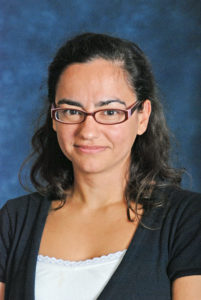 Name:
Name:
Dr Marina Papoutsi
Job Title:
Research Associate
Place of work / study:
Huntington’s disease centre, UCL Institute of Neurology
Area of research:
Cognitive impairment in Huntington’s disease
How is your work funded?
Medical Research Council and Huntington’s disease Society of America (HDSA)
Tell us a little about yourself:
I am Greek. My undergraduate degree was in Greek and Linguistics. I moved to the UK in 2002 to do an MSc in Cognitive Science and NLP at the School of Informatics, University of Edinburgh. Given that my first degree was in humanities and I did not have a background in computer science, it was a big leap, but very rewarding. During that time I also learned about neuroimaging and neuroscience. It was the first time I heard about this field and I found it fascinating that we could study brain function non-invasively. I was then accepted on a PhD programme in Neuroinformatics. During my PhD I contacted a PI at the NIDCD/NIH (Bethesda, MD), whose work I was following, and arranged to spend more than a year in his lab. This was an incredible experience. I then returned back to the UK and over time my research moved into cognitive impairment and brain reorganisation.
Tell us a fun fact about yourself:
I love being out in nature, hugging trees and sipping green tea. When I was a child we would spend all our free time in a cottage by the sea, where we grew our own veg and kept chickens and pigeons. This strengthened my love for the environment and animals. I have been vegetarian since my late teens (vegan for more than 10 yrs).
Why did you choose to work in dementia?
During my first postdoc at Cambridge I worked with healthy older adults and chronic stroke patients to understand how brain reorganisation can preserve cognitive function. I was fascinated by the brain’s innate ability to reorganise following neurodegeneration or severe damage. In 2011 I moved to UCL to work with Prof Tabrizi to understand brain reorganisation in Huntington’s patients and develop novel methods to stimulate brain plasticity.
Working with the patients and getting to know them and their families has been key driving factor. It becomes personal and you want to do the best you can to help them. Both my grandmothers were also diagnosed with dementia in later life, which brought home how devastating the condition is not only for the patient, but also for the families supporting them.
Follow @mp_neuro [1]